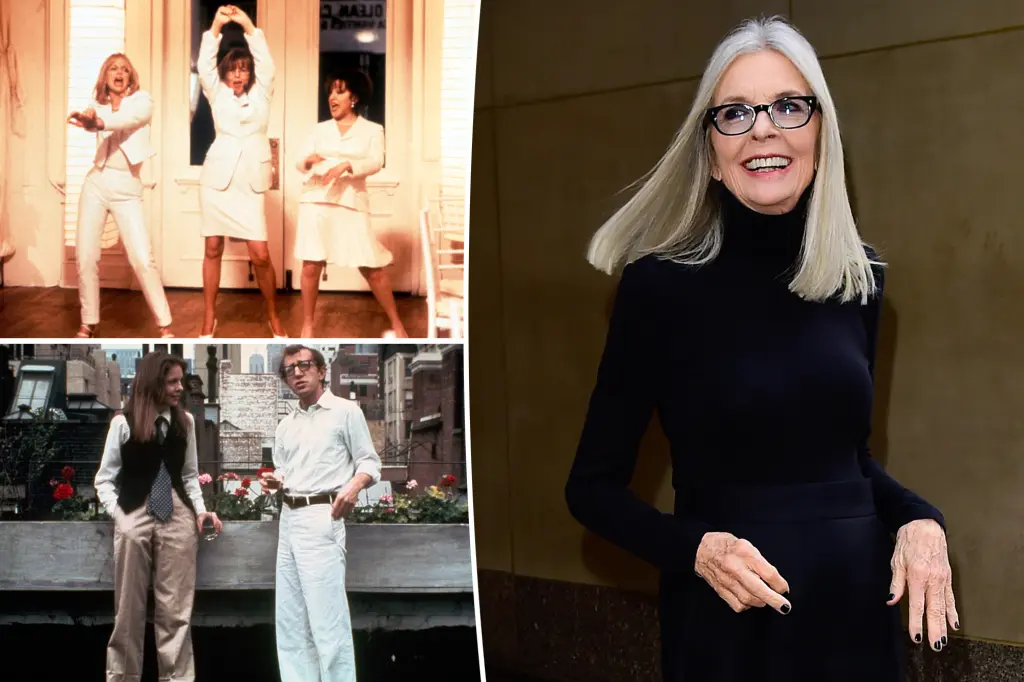Remembering Diane Keaton: A Hollywood Icon’s Extraordinary Life and Legacy
The entertainment world is in mourning following the death of Hollywood legend Diane Keaton, who passed away at the age of 79 in California on Saturday. Her family confirmed her passing, though no specific cause was disclosed. Keaton’s death came as a shock to many, as there had been no public disclosure of any illness. The actress had maintained a relatively low profile in recent months, with her last Instagram post appearing on April 11—a simple photo with her beloved Golden Retriever, Reggie. According to an anonymous friend who spoke to People magazine, Keaton’s health “declined very suddenly, which was heartbreaking for everyone who loved her.” In her final months, she was surrounded only by her closest family members, who chose to keep her condition private. The friend noted that “even longtime friends weren’t fully aware of what was happening,” making her passing all the more unexpected for someone known for such “strength and spirit.”
Born in Los Angeles, Keaton’s remarkable career spanned more than five decades, during which she transformed from an aspiring actress to one of cinema’s most distinctive and beloved figures. Her film debut came in 1970 with “Lovers and Other Strangers,” but it was her role as Kay Adams-Corleone in Francis Ford Coppola’s 1972 masterpiece “The Godfather” that catapulted her to household name status. That same year marked the beginning of her famous collaboration with Woody Allen in “Play It Again, Sam”—a partnership that would eventually span eight films and define a significant portion of her early career. Their professional relationship reached its pinnacle with 1977’s “Annie Hall,” a film that earned Keaton both an Academy Award and a Golden Globe for her portrayal of the quirky, endearing title character. Sources close to Allen reported that the director was “extremely distraught and surprised and upset” upon learning of Keaton’s death, saying the news made him “think of his own mortality.”
Throughout her illustrious career, Keaton continuously reinvented herself while maintaining the authentic, whimsical personality that audiences adored. The 1980s and 1990s saw her charm viewers in hits like “Baby Boom,” the “Father of the Bride” films, and “The First Wives Club,” where her comedic timing and relatable vulnerability shone through. In 2003, she experienced a career renaissance with Nancy Meyers’ romantic comedy “Something’s Gotta Give,” starring opposite Jack Nicholson—a performance that earned her a second Golden Globe and reminded Hollywood of her enduring star power. Remarkably, Keaton’s work ethic never wavered; in the last two decades of her life, she appeared in more than 20 films, including “The Family Stone,” “Because I Said So,” and the surprise hit “Book Club.” Her final on-screen performance came in the 2023 comedy “Summer Camp,” a fitting conclusion to a career defined by warmth and humor.
What made Keaton truly exceptional was her multifaceted talent and curiosity that extended far beyond acting. She directed the 2000 comedy “Hanging Up,” featuring Meg Ryan, Lisa Kudrow, and Walter Matthau in his final role. Her creative pursuits included singing (releasing a holiday song titled “First Christmas” just last year), photography, architecture, and interior design. She published several coffee table books, including “The House That Pinterest Built,” launched her own wine label, and penned two bestselling memoirs—”Then Again” in 2011 and “Brother & Sister” in 2020. This renaissance spirit was celebrated in 2017 when the American Film Institute honored her with a Lifetime Achievement Award. At that ceremony, Meryl Streep eloquently summarized Keaton’s impact, noting that “she has given us so much happiness.”
Keaton’s personal life was as fascinating and unconventional as her on-screen personas. Though she never married, she had notable relationships with some of Hollywood’s most prominent figures, including Al Pacino (with whom she had an on-off relationship for a decade after co-starring in “The Godfather”), Woody Allen, and Warren Beatty (her co-star in the 1981 epic “Reds”). Her distinctive fashion sense—characterized by tuxedos, turtlenecks, bowler hats, and black-rimmed eyeglasses—became as iconic as her performances, influencing generations of women to embrace individuality and androgynous style. Perhaps most remarkably, Keaton redefined societal expectations about motherhood when she adopted two children after her 50th birthday: daughter Dexter, now 29, and son Duke, 25, both of whom survive her.
The news of Keaton’s passing prompted an outpouring of tributes from colleagues and admirers throughout the entertainment industry. Bette Midler, her co-star in “The First Wives Club,” was among the first to express her grief, describing Keaton as “brilliant, beautiful, extraordinary” and “a complete original.” Midler’s sentiment—”What you saw was who she was”—perhaps best captures the essence of Keaton’s appeal: in an industry often defined by artifice, she remained refreshingly authentic, both on and off screen. As Hollywood mourns one of its most treasured talents, Diane Keaton’s legacy lives on through her remarkable body of work, her inimitable style, and the countless lives she touched with her humor, warmth, and unapologetic individuality. She embodied a rare combination of vulnerability and strength, showing generations of women that it was possible to be both feminine and fiercely independent, to find success on one’s own terms, and to approach life with curiosity, creativity, and joy until the very end.















